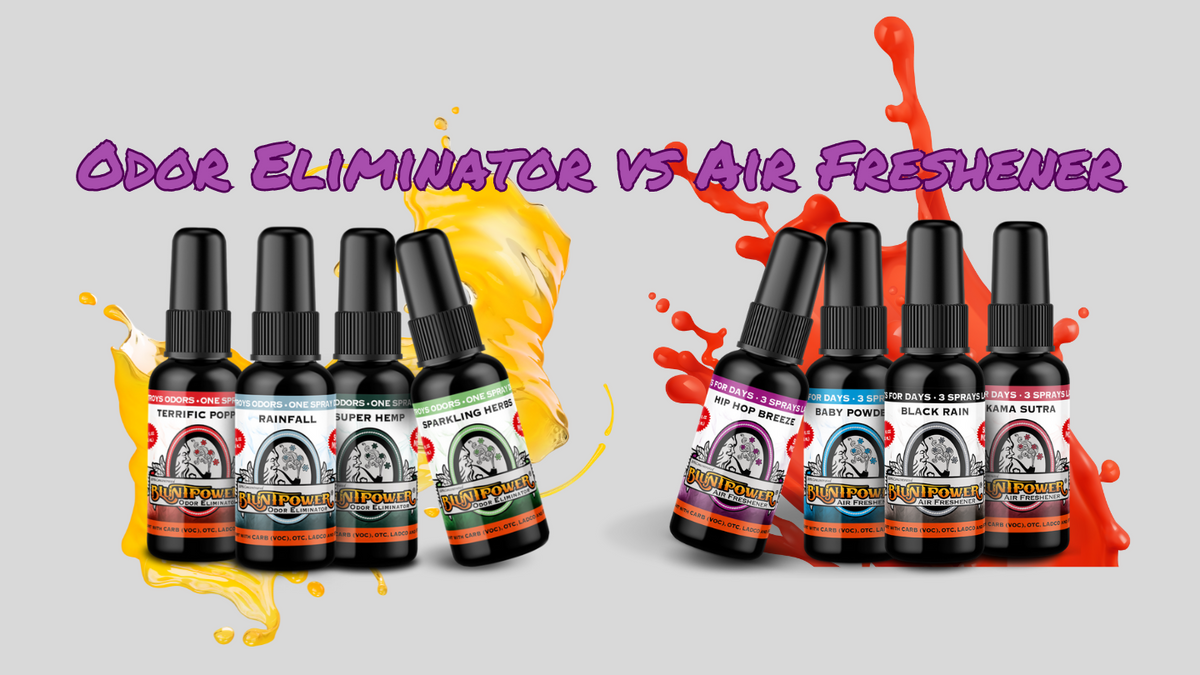
ODOR ELIMINATOR VS AIR FRESHENER
|
|
Time to read 5 min
 My Account
My Account
|
|
Time to read 5 min
We've all been there. That embarrassing moment when a guest politely points out a weird smell.
Maybe you're worried about pet odors, or your teenager's gym bag has taken over the mudroom.
The good news is, you've got options.
This article goes beyond a simple odor eliminator vs air freshener debate to arm you with the facts so you can banish bad smells for good.
Let's be real - air fresheners sometimes feel like putting perfume on a pig. They mask the issue, but eventually, that flowery scent fades, and you're left with the same stale smell. This is because air fresheners just add a more pleasing scent to the mix.
They don't deal with the source of the problem. Odor eliminators, however, use different tactics. Some odor eliminators, like those with activated charcoal, work by trapping odor molecules. Others use chemicals to break down the smelly culprits.
But, have you considered that the root cause of odors in your home might not even be something you can easily spray away? Things like dust mites, pet dander, and mold spores contribute to that 'lived in' smell in our homes. And guess what? An air purifier is designed to pull these particles out of the air.
It doesn't just mask the problem - it tackles those microscopic stink bombs. Think of it as giving your house a deep clean with fresh air- at the air quality level.
While a more expensive upfront cost, they could offer long-term relief from unpleasant odors. If you have been seeking more than just a temporary fix, consider an air purifier to target the source of the problem.
Deciding between an odor eliminator vs air freshener? A lot depends on where that smell is coming from.
If you're dealing with stubborn smells baked into fabrics (hello, old armchairs and musty carpets), a Febreze Unstopables Touch Fabric Spray might be your best bet.
Fabric refreshers often contain odor neutralizers and can help break down smelly molecules clinging to your furniture.
But what about other problem areas? Take a look at the chart below for solutions that will leave your house smelling fresh.
| Problem Area | Solution | Why it Works |
|---|---|---|
| Kitchen Trash | Odor-eliminating trash bags or charcoal filters | Help contain and neutralize cooking odors before they spread |
| Bathroom Odors | Toilet sprays, odor-absorbing gels | Target odors at the source and create a pleasant scent |
| Pet Areas | Enzymatic cleaners, odor-absorbing mats/beds | Break down pet odors at the source and help contain them |
| Musty Closets | Moisture absorbers, cedar blocks, essential oil diffusers | Absorb excess moisture and add a fresh scent |
Knowing the difference between odor eliminators and air fresheners is one thing. Finding effective products? That's where it gets tricky. Don't worry - we did the research for you.
When looking for the right product, be sure to check out the scent options to make sure it is something you like. You may also want to see if the product works best with air circulation, such as turning on a fan.
Although they both freshen the air, they work differently. Air fresheners typically mask smells with fragrance, offering temporary relief. Deodorizers aim to neutralize the source of the odor, making them a more permanent solution to help remove unpleasant odors.
Most air fresheners don’t fully eliminate odors. Instead, they mask them with a fragrance. While this makes the air smell better temporarily, the original odor might still be detectable. They are really just covering up the odor molecules in the air.
That's a bit like asking what the best flavor of ice cream is. But, generally speaking, those containing activated charcoal, baking soda, or certain essential oils, like tea tree oil, are popular for their odor-absorbing and neutralizing properties. Essential oils have become more popular recently for reducing odors.
The effectiveness of odor eliminators really depends on several factors, including the type of eliminator, the source of the odor, and how potent the smell is. The product works best if it is designed for the type of odor you are trying to eliminate. For example, if you are trying to get rid of smoke odors, there are odor eliminators that are specifically designed to get rid of smoke odors freshens. If you need to clean your washing machine, try adding some baking soda to the wash cycle for odor removal.
The size of the area you are trying to remove odor from will determine how much product you will need to use. Check out the manufacturer's instructions to see how many square feet the product covers. The longer the product is in the affected area, such as storage containers or laundry rooms, the better the chance it will remove the odors. You want to avoid using chlorine bleach and fabric softener as they could make the smells worse.
Odor eliminator vs. air freshener? It all boils down to this: do you want to mask the problem or truly eliminate it? By choosing products and solutions tailored to your needs and understanding how different products work, you can breathe easier and create a fresher, more inviting atmosphere in your home. Good riddance, unpleasant smells, you won't be missed.